 String Catalog
VS
String Catalog
VS
 STR18NG
STR18NG
String Catalog
String Catalog revolutionizes app localization through seamless GitHub integration and AI-powered translation capabilities. The platform automatically detects and translates new strings whenever developers push code updates, delivering precise, context-aware translations across 40+ languages.
The service streamlines the localization workflow through automated pull requests, contextual guidance, and real-time translation updates. With features like AI-powered accuracy checks and custom translation preferences, developers can maintain consistent messaging while expanding their global reach efficiently.
STR18NG
STR18NG is a translation management platform designed to empower developers and project managers to automate and centralize language translations for multiple projects. By supporting all known world languages and integrating automatic translation through Google Cloud, the tool simplifies the localization process, enabling users to efficiently manage and export translations in various formats.
The platform allows users to create projects, add string keys, manage language pairs, and perform translations either manually or using AI-driven auto translation. With scalable pricing and easy export options such as JSON, CSV, or ARB, STR18NG accommodates diverse project requirements while ensuring seamless integration into app development workflows.
Pricing
String Catalog Pricing
String Catalog offers Freemium pricing with plans starting from $15 per month .
STR18NG Pricing
STR18NG offers Freemium pricing with plans starting from $5 per month .
Features
String Catalog
- AI-Powered Translation: Delivers precise, context-aware translations for app strings
- GitHub Integration: Automatic detection and localization of new strings
- Automated Pull Requests: Instant updates for new languages or string changes
- Contextual Guidance: Enhanced translation quality through context addition
- Global Language Support: Access to 40+ languages with single dashboard management
- Real-Time Updates: Immediate translation feedback and iterations
- Custom Translation Controls: Adjustable formality, tone, and regional preferences
- Collaborative Tools: Team-based string management capabilities
STR18NG
- Project Management: Organize translations within multiple app-specific projects.
- Multilingual Support: Add and manage all known world languages.
- String Key Management: Use machine-friendly strings for seamless app integration.
- AI Auto Translation: Utilize Google Cloud for automated translations.
- Manual Translation: Option to input or modify translations manually.
- Export Options: Export data as JSON, CSV, or ARB via NPM, API, or dashboard.
- Scalable Pricing: Flexible subscription options to fit different project sizes.
Use Cases
String Catalog Use Cases
- iOS app localization
- Global app deployment
- Release notes translation
- Multi-language app development
- App store optimization for international markets
- Continuous localization integration
- Team-based translation management
STR18NG Use Cases
- Automating multi-language translations for software applications.
- Centralizing localization efforts for large development teams.
- Managing translation workflows for various client projects.
- Facilitating quick export of translation files in standard formats.
- Balancing automated and manual translation for quality control.
FAQs
String Catalog FAQs
-
What is the maximum character limit per string?
Each string can have a maximum of 400 characters. -
How does the Pull Changes feature work?
The Pull Changes feature automatically detects changes in your app's strings when you update your app, identifies new strings that need localization, translates them, and removes outdated strings. -
What file formats are supported?
String Catalog supports .xcloc, .xliff, and .xcstring file formats.
STR18NG FAQs
-
How does STR18NG automate translations?
STR18NG leverages Google Cloud auto-translation to generate translations for string keys across multiple languages automatically. -
Can I manually edit translations in STR18NG?
Yes, the platform allows users to manually add or modify translations alongside AI-generated results. -
What formats can I export my translations in?
Translations can be exported as JSON, CSV, or ARB files via the NPM package, API, or manual download from the dashboard.
Uptime Monitor
Uptime Monitor
Average Uptime
99.72%
Average Response Time
121.03 ms
Last 30 Days
Uptime Monitor
Average Uptime
99.86%
Average Response Time
1739.8 ms
Last 30 Days
String Catalog
STR18NG
More Comparisons:
-
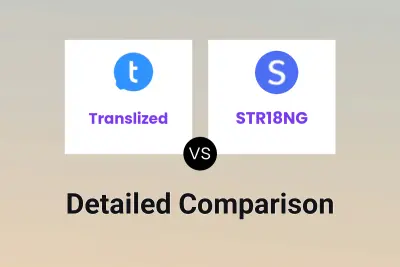
Translized vs STR18NG Detailed comparison features, price
ComparisonView details → -

SimpleLocalize vs STR18NG Detailed comparison features, price
ComparisonView details → -

Smartling vs STR18NG Detailed comparison features, price
ComparisonView details → -

I18Nature vs STR18NG Detailed comparison features, price
ComparisonView details → -
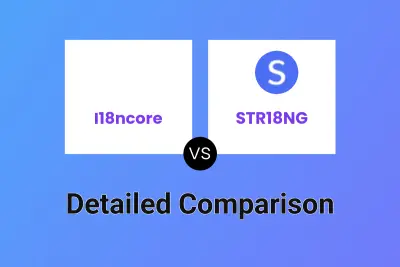
I18ncore vs STR18NG Detailed comparison features, price
ComparisonView details → -
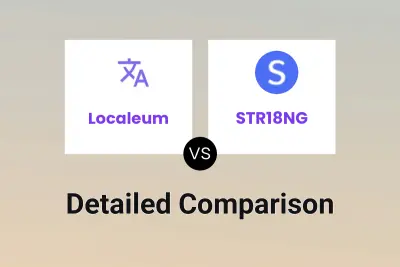
Localeum vs STR18NG Detailed comparison features, price
ComparisonView details → -
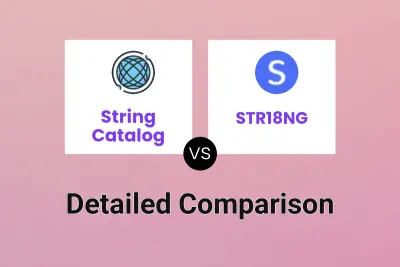
String Catalog vs STR18NG Detailed comparison features, price
ComparisonView details → -
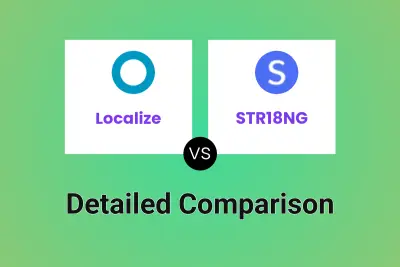
Localize vs STR18NG Detailed comparison features, price
ComparisonView details →
Didn't find tool you were looking for?